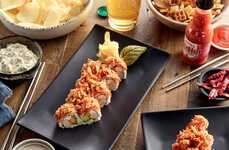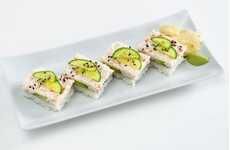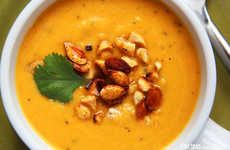
The World's Longest Sushi Roll Spans a Whopping 1.5 Miles
Meghan Young — December 26, 2011 — Lifestyle
References: englishrussia & gizmodo
Sushi is an extremely popular food that many people enjoy, and the world’s longest sushi roll indulges these individuals to the extreme. It may be breaking Guinness World Records, but now the true challenge will be not to waste this mammoth of a meal.
A Japanese restaurant in the city of Yekaterinburg, Russia, was determined to make the world’s longest sushi roll and they were successful in accomplishing that goal. Created in the shopping center aptly named ΜΕΓΑ, this endless snaking sushi roll spans an impressive 2.5 kilometers (1.55 mile) long. It took 60 chefs to craft 1.5 tons of rice, 500 kg of cucumbers, 14 thousand pieces of seaweed and 25 kg of sesame into edible sushi rolls.
A Japanese restaurant in the city of Yekaterinburg, Russia, was determined to make the world’s longest sushi roll and they were successful in accomplishing that goal. Created in the shopping center aptly named ΜΕΓΑ, this endless snaking sushi roll spans an impressive 2.5 kilometers (1.55 mile) long. It took 60 chefs to craft 1.5 tons of rice, 500 kg of cucumbers, 14 thousand pieces of seaweed and 25 kg of sesame into edible sushi rolls.
Trend Themes
1. Giant Food Creations - Creating record-setting, incredibly large servings of traditional meals, such as sushi rolls or hamburgers, which will appeal to foodies and those seeking unique dining experiences.
2. Food Waste Reduction - Developing innovative ways to prevent waste of large food creations, such as partnering with local organizations or hosting community events to share the food with more people.
3. Culinary Tourism - Developing tourism activities based on local cuisine to attract gastronomic enthusiasts from all over the world to experience a culture's food culture.
Industry Implications
1. Restaurant - Creating limited-edition menu items that offer both unique and adventurous dining experiences to attract customers.
2. Event Planning - Developing events that facilitate sharing of large amounts of food to reduce waste or showcase culinary creations.
3. Tourism - Promoting local cuisine as a significant component of a culturally vibrant tourist destination and developing gastronomic tourism offerings to attract visitors.
4.5
Score
Popularity
Activity
Freshness























